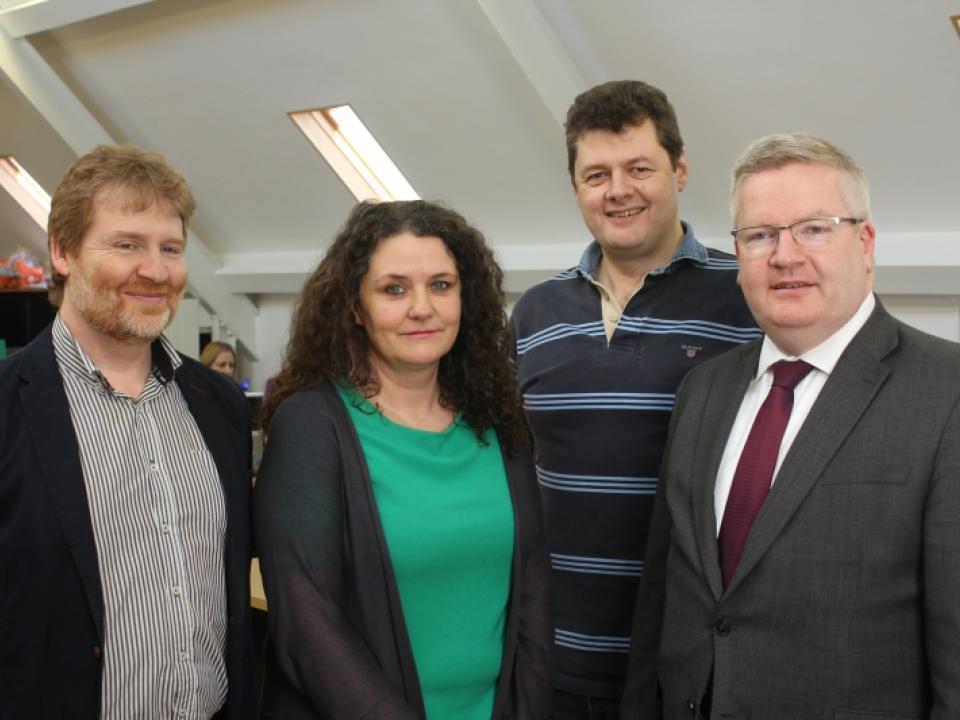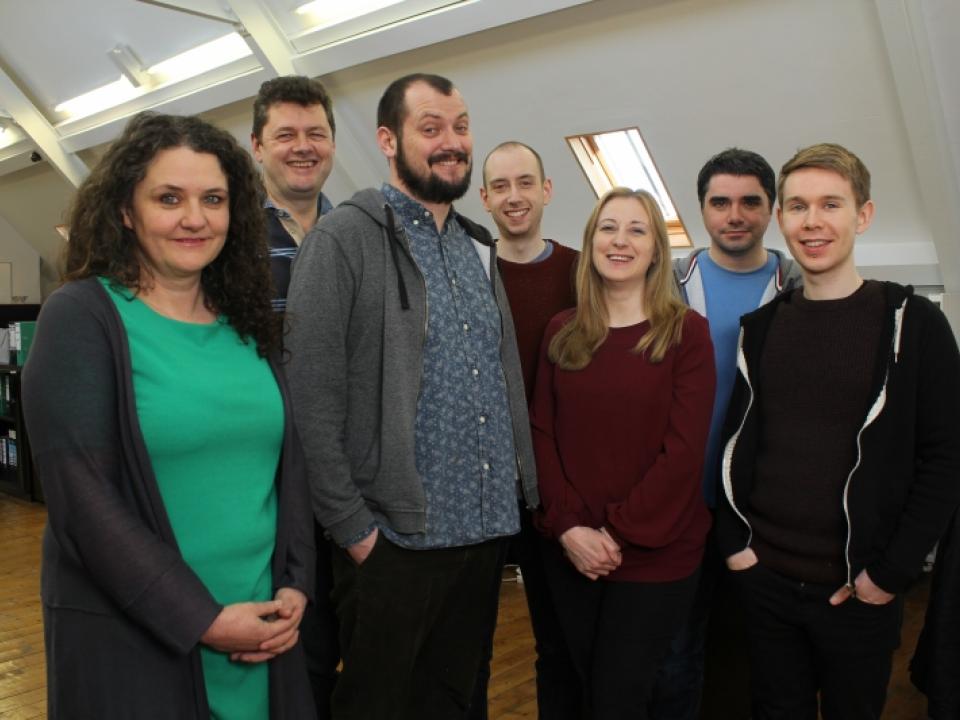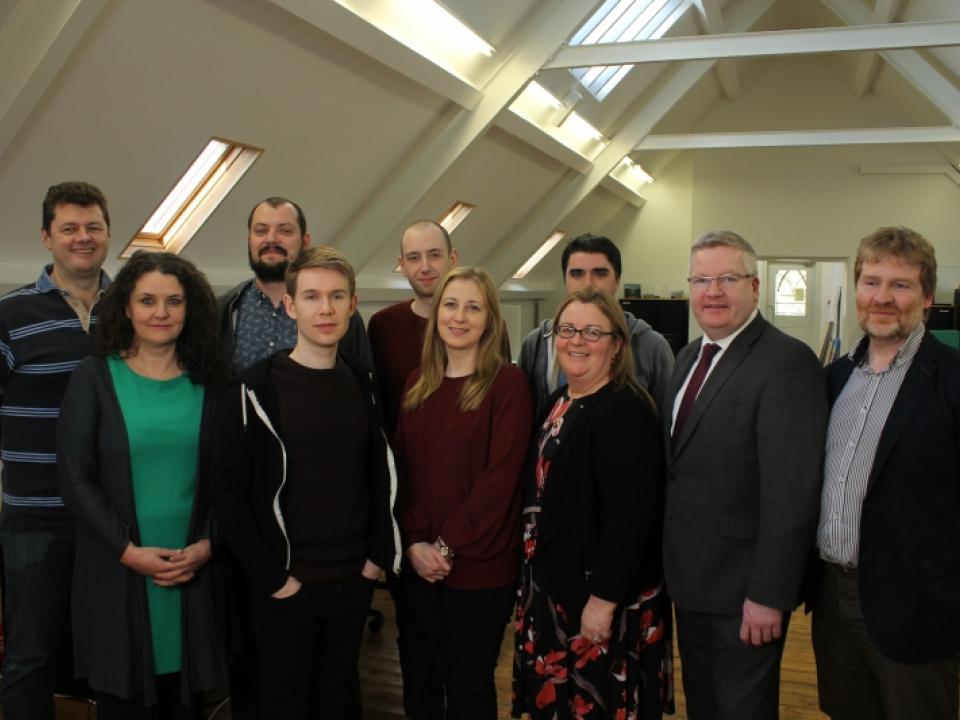Creative Hub established in GMIT's Centre for the Creative Arts & Media
Students’ collaborations with Hub companies enhance career opportunities and experience
A new Creative Hub has been established in GMIT’s Centre for the Creative Arts & Media (CCAM) comprised of companies developing gaming projects, animated features and TV projects for the international marketplace. GMIT students on creative arts and film courses have already commenced working on collaborative projects with four of the Hub companies -Howling Hamster, Doomcube, Moetion Films & Tribal City.
Dr Paddy Tobin, Head of the Campus, explains the rationale behind hosting the companies: “By bringing commercial organisations, industry support, trade associations and networks together with students and academics, we have a melting pot of ideas, contacts and energy - a creative hub.”
Dr Fergal Barry, President of GMIT, says: “This development matches the Institute’s ambition to add new incubation space at all of our campuses. As a consequence it is expected that the cumulative total of job creation supported though GMIT’s Enterprise centres will double from our current baseline and the number of companies supported annually will increase. We will continue to embed the business incubation facilities and programmes through guest lectures and practical assignments or placements where students or graduates assist the start-up companies, or more structured links with our academic departments.”
Moe Honan, producer of the 2015 animated feature ‘Two By Two’, a 4.2 million box office success in the UK /Ireland with eOne, sold worldwide and is currently on Netflix. A sequel and TV series is currently in development with partners in Germany and Luxembourg. Moe sees huge potential for crossover synergy within the Hub. “The space is open and light and the companies here can share knowledge, contacts, networks and skillsets.”
Manus Burke, Howling Hamster games programmer, believes GMIT’s Film and Documentary students have a very valuable contribution to make. “On Monday we will be working with the second year screenwriting students in a Writer’s Room. To explain, within games, each level is effectively a story chapter and the game as a whole must have a story arc. In our Writer’s Room, students will be invited to pitch their story ideas for a level. This may be accepted, workshopped, reworked or rejected but it will give an insight to the creative process and working methodology of a games company”.
Alan Duggan, founder of Tribal City who are the process of designing a game called Runes of Aran that draws on ancient Irish mythology, says: “Our ambition is for The Runes of Aran as a creative Intellectual Property (IP) out of Ireland to rival the largest games in the world and achieve brand recognition in the way that Riverdance, for example, has done in the past. We have been on campus before but the creative atmosphere at CCAM is infectious and a definite plus for us as a creative company”.
The collaborative opportunities between the Creative Hub and the students extend beyond the theory into practice. Manus Burke says “It takes a wide variety of skillsets to make a game: writers, sound engineers, artists. GMIT and its students are an incredible resource for us and we’re very much looking forward to working with them in the future”.
Paul Conway, Games Developer behind the upcoming game, Doomcube, details the struggle for start-ups to gain advancement: “When I started out in the industry over ten years ago I had to get work experience and placements wherever I could to build up the wealth of knowledge required to get hired by a studio. Niall, who works with me in DoomCube, had a similar story when he did work experience with myself and Tribal City Interactive a few years ago. Hopefully we can be supportive of the students here and present them with a similar opportunity”.
Head of CCAM, Dr Paddy Tobin is keen for the benefit to students to extend beyond their years at college and into their careers and, crucially, for this creative pathway to return to the educational cycle. “We are putting structures in place to support internships, particularly with international hosts, and also integrating them into post-graduate programmes. We are further providing opportunities for these graduates to return home after and start-up their own enterprises at CCAM, based on or linked to their international experience and contacts. The pathway opportunities then extend beyond CCAM where we are building relationship with enterprise centres in County Galway and beyond. So, after a period in CCAM, the new enterprises can move to partner locations and remain deeply connected to CCAM and embedded in the overall network.”
For info on courses, see: https://www.gmit.ie/creative-arts-and-media/centre-creative-arts-and-me…


